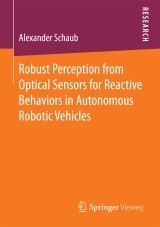Details

Robust Perception from Optical Sensors for Reactive Behaviors in Autonomous Robotic Vehicles
|
53,49 € |
|
| Verlag: | Springer Vieweg |
| Format: | |
| Veröffentl.: | 18.07.2017 |
| ISBN/EAN: | 9783658190873 |
| Sprache: | englisch |
Dieses eBook enthält ein Wasserzeichen.
Beschreibungen
Alexander Schaub examines how a reactive instinctive behavior, similar to instinctive reactions as incorporated by living beings, can be achieved for intelligent mobile robots to extend the classic reasoning approaches. He identifies possible applications for reactive approaches, as they enable a fast response time, increase robustness and have a high abstraction ability, even though reactive methods are not universally applicable. The chosen applications are obstacle avoidance and relative positioning – which can also be utilized for navigation – and a combination of both. The implementation of reactive instinctive behaviors for the identified tasks is then validated in simulation together with real world experiments.<br>
Why Mobile Robots Should Have an Artificial Instinct.- Vision-Based Reactive Controllers.- Evaluation in Real World Tests and in Simulation.
Alexander Schaub joined the Robotics and Mechatronics Center of the German Aerospace Center (DLR) in 2009 and worked in the development of a robotic electric vehicle and researched in the field of vision-based control and reactive instinctive behaviors for autonomous vehicle. In 2017, he started an MBA at HEC Paris and will continue working in the field of autonomous driving afterwards.
Alexander Schaub examines how a reactive instinctive behavior, similar to instinctive reactions as incorporated by living beings, can be achieved for intelligent mobile robots to extend the classic reasoning approaches. He identifies possible applications for reactive approaches, as they enable a fast response time, increase robustness and have a high abstraction ability, even though reactive methods are not universally applicable. The chosen applications are obstacle avoidance and relative positioning – which can also be utilized for navigation – and a combination of both. The implementation of reactive instinctive behaviors for the identified tasks is then validated in simulation together with real world experiments.<div><br></div><div><b>Contents</b></div><ul><li>Why Mobile Robots Should Have an Artificial Instinct<br></li><li>Vision-Based Reactive Controllers<br></li><li>Evaluation in Real World Tests and in Simulation</li></ul><div><b>Target Groups</b></div><div><ul><li>Lecturersand students in the field of Robotics, Control Engineering, Computer Vision <br></li><li>Practitioners in the field of Intelligent Vehicles, Mobile Robots </li></ul></div><div><b>About the Author</b></div><div><b>Alexander Schaub</b> joined the Robotics and Mechatronics Center of the German Aerospace Center (DLR) in 2009 and worked in the development of a robotic electric vehicle and researched in the field of vision-based control and reactive instinctive behaviors for autonomous vehicle. In 2017, he started an MBA at HEC Paris and will continue working in the field of autonomous driving afterwards.</div><div><br></div>
Publication in the field of technical sciences Includes supplementary material: sn.pub/extras
Diese Produkte könnten Sie auch interessieren:

High-Frequency Oscillator Design for Integrated Transceivers

von: J. van der Tang, Dieter Kasperkovitz, Arthur H.M. van Roermund

149,79 €















